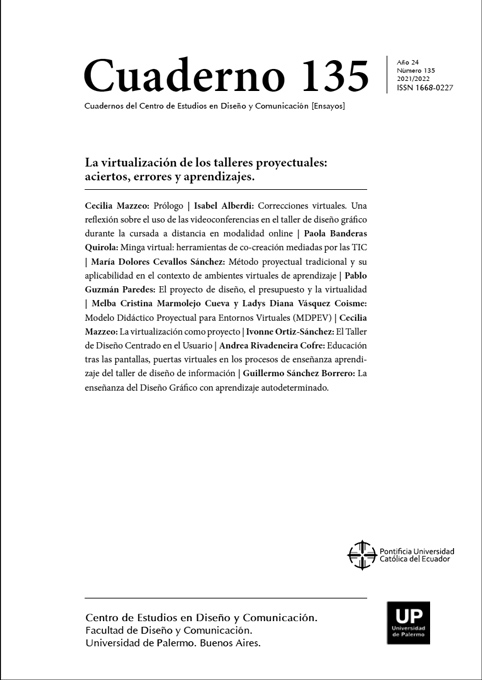Minga virtual: herramientas de co-creación mediadas por las TIC
Abstract
The year 2020 faced the SARS-COV2 pandemic, which brought with it the virtualization of education worldwide and with it new challenges in teaching-learning strategies. This leap was a great step for education where the success of the process responds to the commitment of the actors to the chair and the modality. An example of this process has been the Participatory Design Workshop, a subject that belongs to the formative section of the redesign of the PUCE Product Career and has the particularity of developing co-creation methods with vulnerable communities that have little access to design. and the benefits it provides. In the second semester of 2020 this subject was taught for the first time and developed in collaboration with the Sara Sisa community. This group of indigenous women from Llano Grande is recovering their customs through embroidery and have found in this technique a source of economic income, personal satisfaction, empowerment and collective development. This article presents tools that allow the academy to approach the local reality through the virtual minga as a cooperative process for the construction of projects that take into account differences as strengths for the construction of innovative products with value. It should be noted that the institution, with its background of quality training, has developed various means of virtual communication between teachers and students, which has made it possible to train trained professionals, empathic and committed to society, from various angles, demonstrating that the processes of cooperation Creation can be successfully supported by the new information and communication technologies.
References
Aubert, A., Flecha, A., García, C., Flecha, R. y Racionero, S. (2008). Aprendizaje Dialógico en la Sociedad de la información. Barcelona: Hipatia Editorial.
Barkley, E., Cross, D. & Howell, C. (2007). Técnicas de aprendizaje colaborativo. Madrid: Morta
Borja, R. (2012). Enciclopedia de la Política. México D.F. Fondo de Cultura Económica.
Bruna Castro, Carolina. (2019). Sobre la relación entre individualidad y colectividad. Notas a el hechicero de la tribu. Mario Vargas Llosa y el liberalism en America Latina de Atilio Borón. Atenea (Concepción), (520), 147-154. https://dx.doi.org/10.4067/S0718-04622019000200147
Cruz, Miguel. (2018). Cosmovisión Andina e Interculturalidad: Una mirada al desarrollo sostenible desde el Sumak Kawsay. Revista Chakiñan de Ciencias Sociales y Humanidades, (5), 119-132. Recuperado en 13 de marzo de 2021, de http://scielo.senescyt.gob.ec/scielo.php?script=sci_arttext&pid=S2550-67222018000100119&lng=es&tlng=es.
Gros, Begoña. (2019). La investigación sobre el diseño participativo de entornos digitales de aprendizaje. University of Barcelona.
Hall, Budd L. (1983). Investigación participativa, Conocimiento Popular y Poder: una reflexión personal. México: Biblioteca Digital CREFAL.
Lordas, M. (2011). Aportes para la investigación geográfica a partir de la observación participante y de entrevistas. M Lorda - Huellas, 2011 - biblioteca.unlpam.edu.ar
Masferrer, Alejandro. (2019). Diseño de procesos creativos: Metodología para idear y co-crear en equipo. Barcelona: Gustavo Gili. Real Academia Española. (s.f.). Minga. En Diccionario de la lengua española. Recuperado en 12 de abril de 2021, de https://dle.rae.es/minga Real Academia Española. (s.f.). Co. En Diccionario de la lengua española. Recuperado en 12 de abril de 2021, de https://dle.rae.es/coReal Academia Española. (s.f.). Crear. En Diccionario de la lengua española. Recuperado en 12 de abril de 2021, de https://dle.rae.es/creaci%C3%B3n?m=form
Ribes Giner, G., & Peralt, A. (2014). Methods and techniques facilitators of co-creation innovation in master programs for postgraduate market. Intangible Capital, 10(1), 101- 124. doi:http://dx.doi.org/10.3926/ic.443
Ron, José. (1997). Sobre el concepto de cultura. Quito: IADAP. Sánchez Hernández, Arturo José. (2005). Análisis filosófico del concepto valor. Humanidades Médicas, 5(2) Recuperado en 01 de abril de 2021, de http://scielo.sld.cu/scielo.php?script=sci_arttext&pid=S1727-81202005000200009&lng=es&tlng=es.
Wilches, D. (2019, 13 diciembre). Aportes de la co-creación para la innovación y las relaciones con clientes. http://www.scielo.org.co/. http://doi.org/10.14349/sumneg/2020.V11.N24.A9
Los autores/as que publiquen en esta revista ceden los derechos de autor y de publicación a "Cuadernos del Centro de Estudios de Diseño y Comunicación", Aceptando el registro de su trabajo bajo una licencia de atribución de Creative Commons, que permite a terceros utilizar lo publicado siempre que de el crédito pertinente a los autores y a esta revista.


